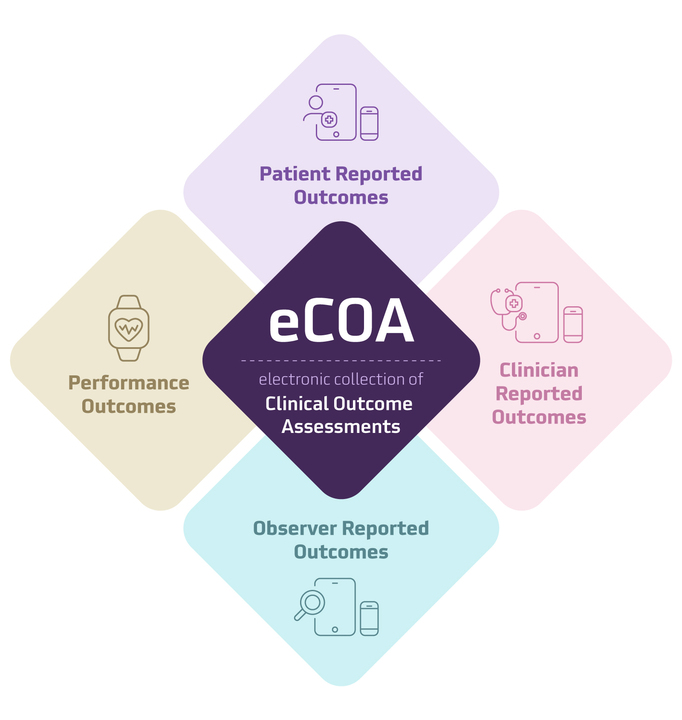Snapshot:
- Overview of eCOA: Electronic Clinical Outcome Assessments (eCOA) are digital tools used in clinical trials to collect data on patient outcomes, including outcomes reported by patients, clinicians, and observers, as well as performance metrics.
- Benefits Over Paper Methods: eCOA addresses the inaccuracies of paper-based data collection and improves data quality.
- Data Collection and Patient Compliance: Data can be collected through various devices, including mobile devices and integrated health monitors. Features like real-time data entry, reminders, and notifications help maintain patient compliance.
- Enhancing Clinical Trial Success: Efficient to implement, Suvoda eCOA is designed for ease of use, provides real-time data visibility, and integrates seamlessly with other clinical trial technologies, contributing to more streamlined trials.
Electronic Clinical Outcome Assessments (eCOA) are digital tools used to capture patients’ outcomes data throughout a clinical trial. These data may include patient reported outcomes (ePRO), clinician-reported outcomes (eClinRO), observer-reported outcomes (eObsRO), and performance outcomes (ePerfO).
Clinical trials rely on high quality data to answer crucial questions about the patient’s condition and potential benefits or side effects of the treatment. The method used to collect this information can impact the integrity and quality of the data.

Traditionally, paper-based Patient Reported Outcomes (PROs) such as diaries and questionnaires were used to assess the patient’s experience. Paper data collection puts unnecessary burden on the trial staff to enter and reconcile data between paper forms and the electronic system. Moreover, this system is prone to inaccuracies and poor data quality due to retrospective data entry (“parking lot syndrome”), poor adherence to instructions, illogical responses, and incomplete assessments. Additionally, paper-based PROs introduce the risk of human-error by the trial staff when transcribing handwritten data into an electronic system.
Electronic patient-reported outcomes (ePROs) have since gained prominence over the past two decades—alleviating paper-based burdens while providing reliable, accurate, and secure data. The benefits of electronic collection not only apply to PROs but to COAs in general.
At its core, eCOA focuses on improving data accuracy while prioritizing ease for patients and sites. It empowers clinicians, patients, and caregivers to report outcomes digitally, leaving behind the burden and error-prone nature of paper data collection.
How Does eCOA Collect Data?
Several data collection methods are used—whether through provisioned or bring-your-own mobile data collection devices—to gather clinician-reported, patient-reported, and observer-reported outcomes. Some assessments that are collected include diaries, indication-specific and quality-of-life questionnaires, as well as integrated devices such as spirometers, blood glucose meters, and activity monitors for performance outcomes.
eCOA for Electronic Patient Reported Outcomes
Looking at ePRO specifically, it is a set of tools to collect outcome measures related to a patient’s experiences and health during a clinical trial, encompassing:
- Physical symptoms: Tangible symptoms such as pain, itch, or digestive problems.
- Ability to function: Ability to perform daily activities such as walking up stairs.
- Quality of Life: A broad concept covering many aspects of a patient’s health and well-being.
It is especially useful in therapeutic areas that focus on understanding patient experiences and health outcomes, such as oncology, dermatology, and gastroenterology. Note that ePRO is not designed to capture laboratory measures like vital signs, bloodwork, or tissue samples.
eCOA Data Collection Benefits
Better patient reporting
For patients, eCOA brings the convenience of entering data electronically wherever they are, minimizing recall errors and fostering sustained participation in clinical trials. Reminders for data entry help patients record their data in real-time and can prevent data from being discarded due to inaccuracies. Reminders, alarms, and notifications also help patients to establish a routine around their data entry, which is critical for improving patient compliance. An early and pivotal eCOA study revealed that electronic patient outcomes reporting achieved 94% patient compliance, compared to the 11% compliance observed with paper-based methods. Since then, on average, studies have reported that using paper tends to achieve approximately 50% on-time reporting compliance.
Real-time data and insights
Site and sponsor teams get immediate visibility to patient information and data entry, which enables faster decision-making and interventions when necessary. The real-time data entry also eliminates errors associated with transcribing paper-based data into an electronic system.
Data privacy and compliance
eCOA platforms use encrypted channels to transmit patient data to study databases, protecting confidentiality and providing data protection while adhering to regulatory standards. The real-time visibility into outcomes data allows sponsors to respond promptly to data gaps and compliance issues, promoting data accuracy throughout the trial.
Subsequently, the data collected and stored in an eCOA solution can be shared with other eClinical technologies like Interactive Response Technology (IRT) or electronic data capture (EDC) systems—reducing data re-entry. Study teams then have better data integrity and a clean database ready for analysis. The real-time visibility also allows them to proactively monitor trial progress, making sure that the data collected is compliant before submission.
How eCOA Can Increase the Chance of Clinical Trial Success
Today’s clinical trials require resilience and demand efficiency, speed, and accuracy. eCOA has the potential to be an important tool for a more streamlined data collection process and reduced stakeholder burden. Like any technology, eCOA will be most effective at improving reporting compliance and data accuracy when the product is designed with the user at the center, with patients, sites, and sponsors providing input into the product design so the technology is usable and intuitive. What’s more, strong processes and purpose-built services surrounding eCOA delivery and maintenance are critical to realize its promise.
Suvoda eCOA provides rapid and efficient implementation, is delivered on a single platform with IRT and eConsent, and seamlessly integrates with other third-party clinical trial technologies. What’s more, rigorous, third-party usability testing demonstrates that patients find Suvoda eCOA to be easy to navigate, intuitive, clear, and well-designed.
Discover how Suvoda eCOA can bring you closer to more efficient, effective, and patient-centered clinical trials.
Cara Therapeutics achieves increased compliance with Suvoda eCOA
Learn how Cara Therapeutics used Suvoda eCOA to:• Streamline study operations
• Enhance data visibility
• Streamline questionnaire localization and licensing

